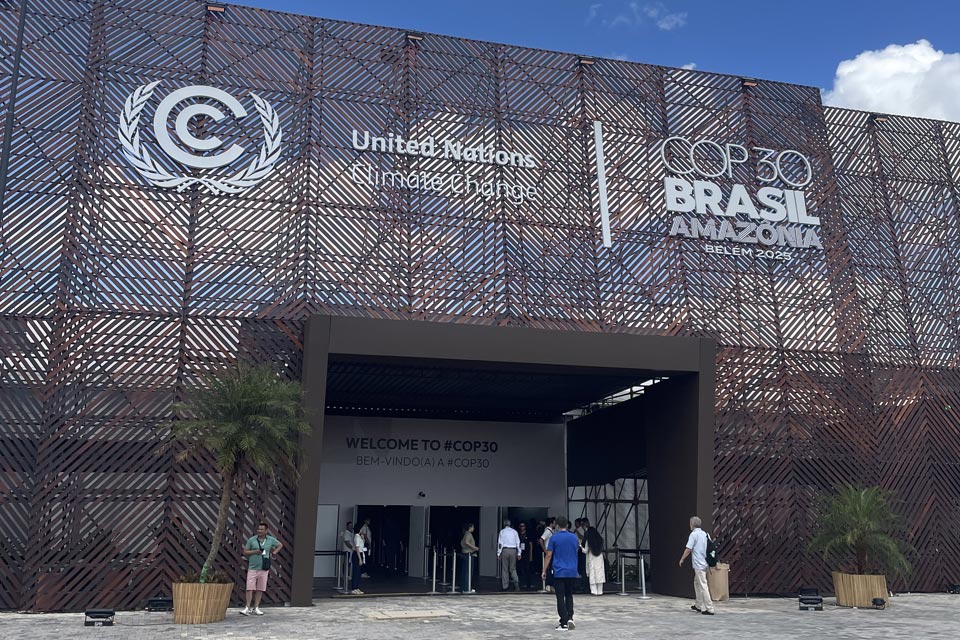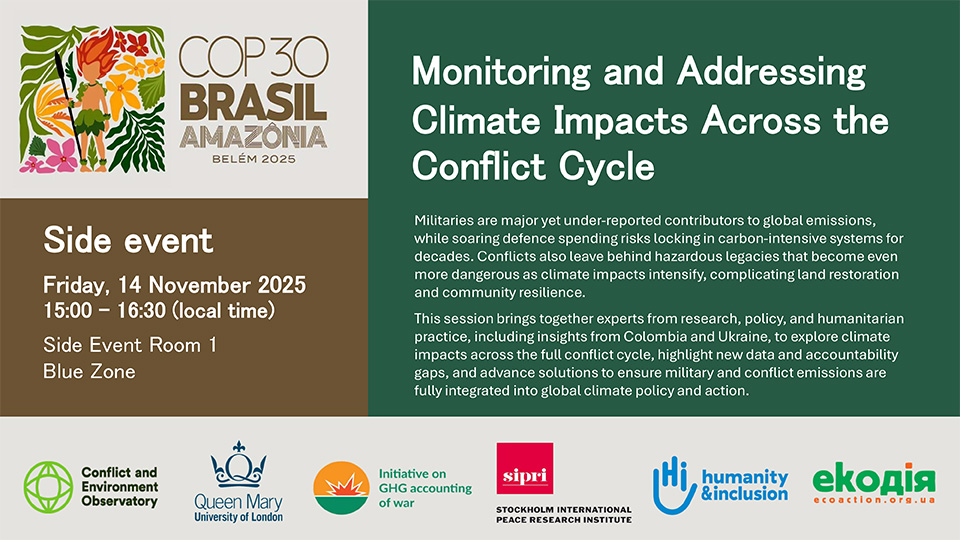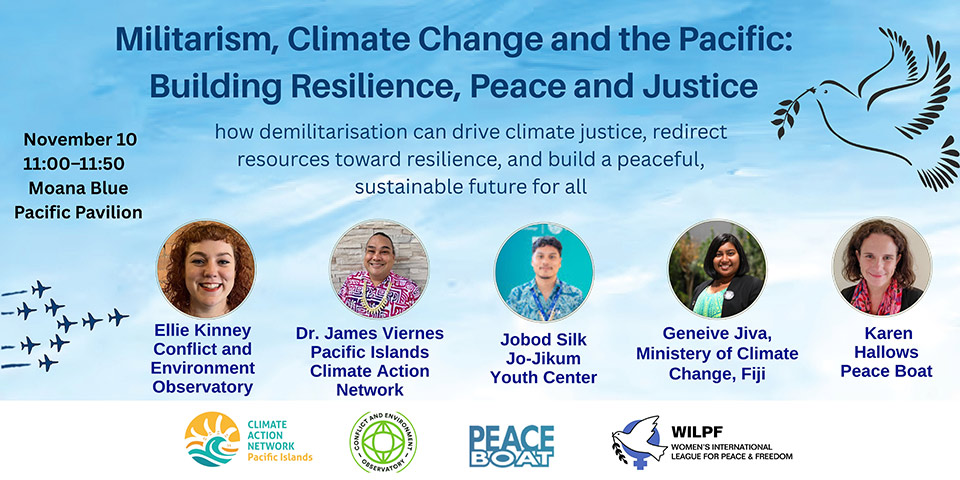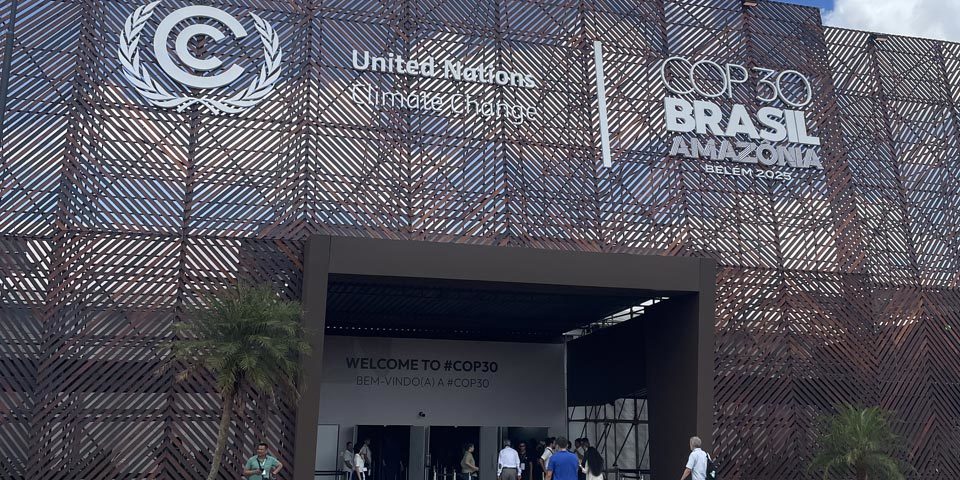Is the UNFCCC increasingly out of step with the wider geopolitical context of the climate crisis?

COP30 is taking place against a backdrop of armed conflicts and rising military spending. With wars affecting every corner of the globe and spending at a record high of $2.7 trillion, 2024 also saw humanity breach the Paris Agreement’s 1.5oC target. In this post Ellie Kinney asks what, if anything, COP30 will deliver on conflict, climate and militarism.
The Amazonian COP
Brazil has been in the spotlight ever since COP27, when then President-elect Lula launched a passionate bid to host COP30. From controversial infrastructure plans to newly announced oil and gas exploration licences in the Amazon, this COP, like those before it, is not without its contradictions. Brazil is already the eighth largest oil and gas producer, and has faced criticism for fuelling what Lula elsewhere described as the “premeditated genocide” in Gaza through oil exports to Israel. Nevertheless, Lula’s presidency has seen progress in Brazil’s approach to climate and environmental policy, with deforestation at an 11 year low. This has helped Brazil to reduce its emissions, although it is expected to miss its 2025 target of 48.4% compared to 2005.
Branded the Amazonian COP, the Brazilian presidency has focused its efforts on establishing a ‘Tropical Forest Forever Facility’, an initiative aiming to change the economic calculus of deforestation. Brazil has frequently positioned itself as a leader on environmental and climate policy in the past but its intersection with peace and security has been sensitive at times, with tensions around securitisation linked to fears of external interference in its management of natural resources. But as COP30 has approached, Lula has been vocal in calling out increasing militarisation. At last week’s COP30 Leaders Summit he argued that: “…spending twice as much on weapons as we do on climate action is paving the way for climate apocalypse”, adding that: “there will be no energy security in a world at war.” Articulating the link between increased military spending and reduced climate and development finance fits well with Brazil’s oft pursued role as a leader of the Global South but it remains to be seen how this will be reflected in the presidency’s COP30 activities.
The missing peace
The UAE and Azerbaijan launched flagship COP presidency peace initiatives: the Declaration On Climate, Relief, Recovery And Peace and the Baku Hub Initiative, respectively. COP30 marks a departure from this, with no thematic peace day or presidency peace initiative. While previous initiatives have failed to tackle the impact of conflicts and military activities on the climate, they nevertheless provided a welcome UNFCCC entry point for raising this intersection. Interestingly, a late programme addition of a climate, relief, recovery and peace event suggests that some interest may remain.
Progress regardless
While attention on military emissions reporting and sectoral decarbonisation is struggling against the rising tide of global military spending, there are some signs of progress. The European Parliament once again used its annual COP resolution to stress that: ‘the defence sector must contribute to tackling climate change by reducing its emissions intensity while maintaining operational effectiveness’, and for EU decisionmakers to: ‘formulate a proposal to increase the transparency of accounting of military emissions to the UNFCCC’. Although EU climate policy is under political pressure, military decarbonisation continues to surface; the bloc’s recent global climate and energy vision foregrounded how: ‘it is imperative that the EU manages the interplay between its security imperatives and its clean transition goals’.
Elsewhere, the recent International Court of Justice Advisory Opinion on states’ obligations in relation to climate change provided a landmark moment for climate action, clearly setting out the benchmark for commitments from states. While references to military and conflict emissions were absent from the main opinion, Judge Cleveland’s individual declaration focused on precisely this, noting that: “the obligations of States under the climate change treaties and customary international law to assess, report on and mitigate harms to the climate system include responsibility to address the impacts resulting from armed conflict and other military activities”. The arguments against military emissions reporting and reductions grow weaker by the day.
Free to protest, at last!
After three consecutive COPs held in states where freedom of speech and protest rights are restricted, COP30 brings with it a vibrant programme of civil society activity outside the conference’s official ‘blue zone’. The People’s Summit, hosted by Peoples Rising for Climate Justice, is expected to attract thousands, with activities including a river flotilla and a march through Belém’s streets. One Summit event will provide a platform for grassroots communities to share their lived experiences of war and militarism.
Beyond Belém, civil society organisations have been raising their voices ahead of the summit. CEOBS is pleased to be a partner of the War on Climate, a global initiative whose COP30 call to action demands mandatory military emissions reporting, military emissions reductions, and prioritisation for climate action funding over escalating military spending; as of today 88 organisations have backed the call.
A busy COP30 schedule for militarism
In COP30’s blue zone, multiple side events will address the climate impacts of militaries. CEOBS is jointly hosting an event titled Monitoring and addressing climate impacts across the conflict cycle, in partnership with Queen Mary University of London, the Stockholm International Peace Research Institute, Humanity and Inclusion and Arctic Basecamp. The event aims to broaden understanding of how conflict and climate change interact, and will consider the emissions from conflict alongside those before and after wartime.

SIPRI’s Bárbara Magalhães Teixeira will speak on the connections between rising military spending and emissions, whereas Lennard de Klerk from the Initiative on GHG Accounting of War will outline how rearmament translates into climate damage. Dr Benjamin Neimark will present research estimating the emissions from Gaza, Ukraine’s EcoAction will focus on emissions and green recovery, while Humanity and Inclusion will show how they predict climate risks in areas of Colombia contaminated with explosive ordnance.

Ours is just one of a number of events this year, and we’re just one of many organisations speaking up, with further contributions from the Women’s International League for Peace and Freedom, Ecoaction, Green Wave, Peace Boat, Global Grassroots Justice Alliance, Just Transition Alliance, National Farmers Union, the Landworkers’ Alliance, and the Initiative on GHG Accounting of War; a truly diverse coalition. Sadly reductions in the UNFCCC’s budget mean that no side events will be livestreamed or recorded this year.
A widening Military Emissions Gap
We launched the latest update to the Military Emissions Gap database ahead of COP30. It brings together the data that governments report to the UNFCCC into one place and analyses it for transparency and accessibility. Since military emissions reporting to the UNFCCC is voluntary, we find that data is patchy, incomplete or missing altogether. This year, we’ve found that the military emissions gap is widening; with the US and China no longer reporting their military emissions.
The Trump administration is not submitting an annual greenhouse gas emissions report to the UNFCCC this year, while China has reported but now claims that its military emissions are ‘not occuring’; a questionable statement from the world’s second largest military spender. The US and China collectively spend $1.3 trillion on their militaries; which means that the carbon cost of half of all global military spending is not properly accounted for in UN reporting. With this spending increasingly to the detriment of climate action, reform of UN emissions reporting feels increasingly urgent.
Action in Belém
Looking ahead, the presidency’s reticence on this topic is not reflected by civil society. Progress is always glacial at the UNFCCC — it took until COP28 for a transition away from fossil fuels to be acknowledged — but the disparity between its agenda and the geopolitical context becomes more apparent each year. Last week’s Leaders Summit saw many draw connections between the impact of conflicts and climate action. While COP30 won’t choose action on this intersection over words, it may yet sustain some momentum from the past two COPs peace agendas.
Ellie Kinney is CEOBS’ Senior Climate Advocacy Officer. If you find our work useful, please consider a donation so that we can continue it.





